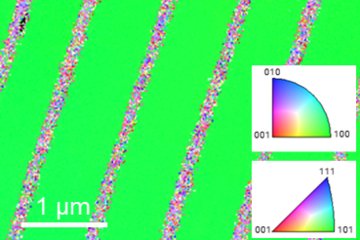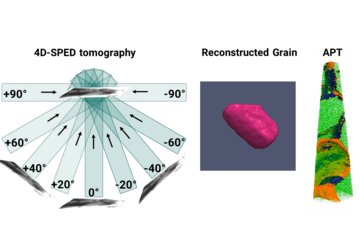All genres
121.
Journal Article
Theoretical modeling of growth processes, extended defects, and electronic properties of III-nitride semiconductor nanostructures. Physica Status Solidi B 248 (8), pp. 1837 - 1852 (2011)
122.
Journal Article
Formation energies of point defects at finite temperatures. Physica Status Solidi B 248 (6), pp. 1295 - 1308 (2011)
123.
Journal Article
The influence of additions of Al and Si on the lattice stability of fcc and hcp Fe–Mn random alloys. Journal of Physics: Condensed Matter 23 (24), 246003 (2011)
124.
Journal Article
Role of spin quantization in determining the thermodynamic properties of magnetic transition metals. Physical Review B 83 (16), 165114 (2011)
125.
Journal Article
First-principles investigation of the effect of carbon on the stacking fault energy of Fe–C alloys. Acta Materialia 59, pp. 3041 - 3048 (2011)
126.
Journal Article
Determining the elasticity of materials employing quantum mechanical approaches: From the electronic ground state to the limits of materials stability. Steel Research International 82 (2), pp. 86 - 100 (2011)
127.
Journal Article
First-principles study of the thermodynamics of hydrogen-vacancy interaction in fcc iron. Physical Review B 82 (22), pp. 224104-1 - 224104-11 (2010)
128.
Journal Article
Ab initio study of thermodynamic, structural, and elastic properties of Mg-substituted crystalline calcite. Acta Biomaterialia 6 (12), pp. 4506 - 4512 (2010)
129.
Journal Article
Rescaled Monte Carlo approach for magnetic systems: Ab initio thermodynamics of bcc iron. Physical Review B 81 (13), pp. 134425 - 134434 (2010)
130.
Journal Article
Plane-wave implementation of the real-space k.p formalism and continuum elasticity theory. Computer Physics Communications 181 (4), pp. 765 - 771 (2010)
131.
Journal Article
Ab initio study on the solubility and kinetics of hydrogen in austenitic high Mn steels. (submitted)
132.
Journal Article
Thermodynamic properties of cementite (Fe3C). CALPHAD: Computer Coupling of Phase Diagrams and Thermochemistry 34, pp. 129 - 133 (2010)
133.
Journal Article
Polarization-induced charge carrier separation in polar and nonpolar grown GaN quantum dots. Journal of Applied Physics 106, pp. 083707-1 - 083707-7 (2009)
134.
Journal Article
The Effect of Disorder on the Concentration-Dependence of Stacking Fault Energies in Fe1-xMnx – A First Principles Study. Steel Research International 80 (9), pp. 603 - 608 (2009)
135.
Journal Article
Pressure dependence of the Curie temperature in bcc iron studied by ab initio simulations. Physical Review B 79, 184406, pp. 184406-1 - 184406-5 (2009)
136.
Journal Article
Ab initio up to the melting point: Anharmonicity and vacancies in aluminum. Physical Review B 79 (13), 134106 (2009)
137.
Journal Article
Understanding the phase transformations of the Ni2MnGa shape memory system from first principles. Physical Review Letters 102 (3), 035702 (2009)
138.
Journal Article
Steel design from fully parameter-free ab initio computer simulations. Steel Research International 80, pp. 4 - 8 (2009)
139.
Journal Article
A comparison of atomistic and continuum theoretical approaches to determine electronic properties of GaN/AlN quantum dots. Physical Review B 78, 235302 (2008)
140.
Journal Article
A map for phase-change materials. Nature Materials 7, pp. 972 - 977 (2008)











